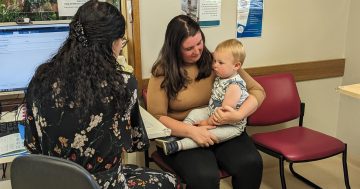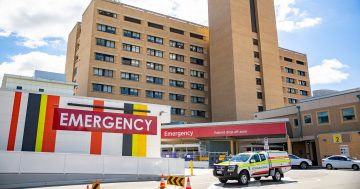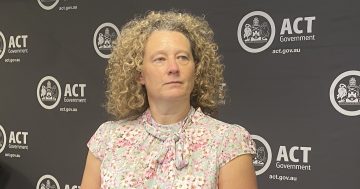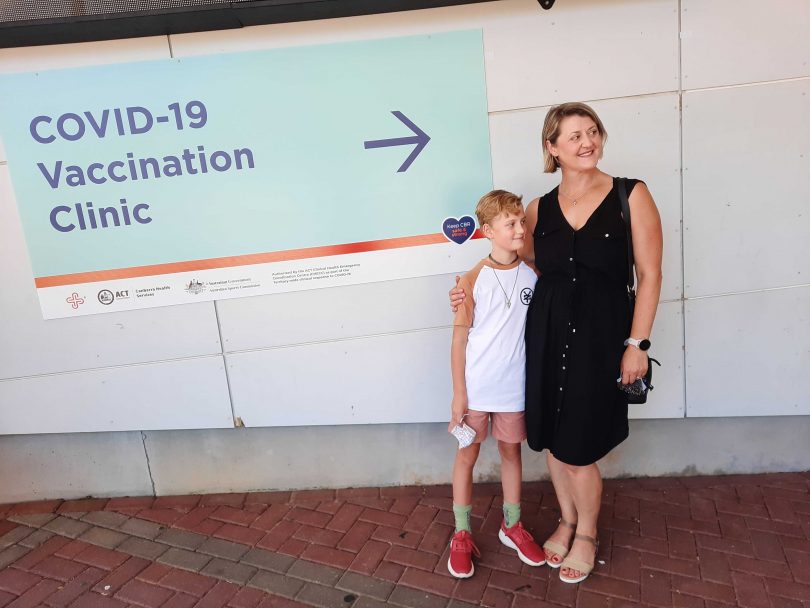
Emma Nikolic and daughter June Tattam on their way into the AIS vaccination clinic. Photo: Ian Bushnell.
Almost half of the ACT’s children aged five to 11 will start or go back to school at the end of the month with a first pediatric jab of Pfizer COVID-19 vaccine, about a third of the adult dose.
The vaccination program for those children kicked off today across ACT Government clinics, pharmacies and GPs, and that’s a relief for Emma Nikolic and her 10-year-old daughter June Tattam from Kambah, who lined up at the AIS Arena clinic for her first jab.
Like many, Ms Nikolic thought that the worst may have been over before Christmas, but with the rising number of cases, including some in her immediate family, she was feeling a little anxious about what it meant for June returning to school.
“It’s actually a bit of a relief to be here, really,” she said. “June’s the last in our family to get vaccinated, so it’s a big relief to know that she’s on her way to being fully vaccinated.”
Ms Nikolic, who has had a booster shot, said the family talked a lot about vaccination in the household and doing its bit not only to protect themselves but the community in general, and those who may be more vulnerable.
She said the family had been more cautious in the past few weeks and mindful about gatherings and wearing masks.
“Just knowing that we did have an unvaccinated person in our family and also because I have elderly parents and you want to make sure that we don’t put them at risk as well,” Ms Nikolic said.
June admitted to a few nerves but understood the importance of being protected.
“I’m a bit nervous, but afterwards, I get a lollipop,” she said, acknowledging that she will need to do it all again in eight weeks.
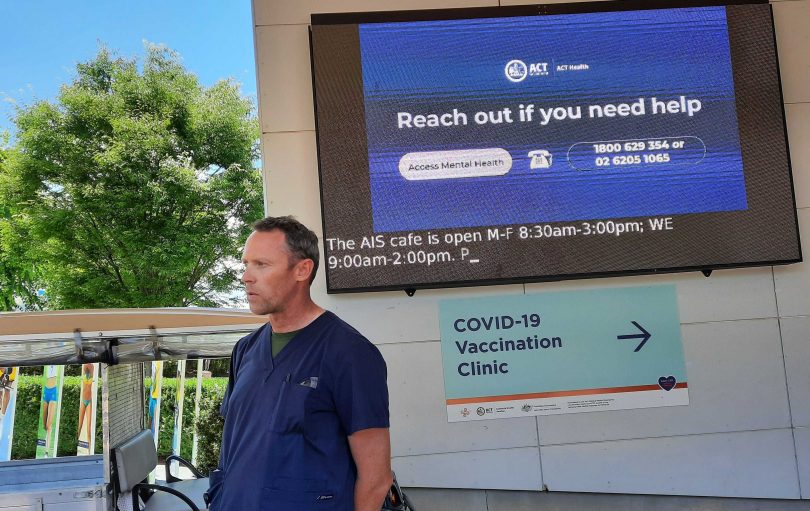
Clinical nurse Brendan Higgins at the AIS vaccination clinic: no issues with supply. Photo: Ian Bushnell.
Canberra Health Services clinical nurse Brendan Higgins said vaccinations for five to 11-year-olds were booked out for the next two weeks, but with supply of 7000 doses a week, the program was on track to deliver a first shot to about half of the 40,000 to 45,000 children in that cohort before school resumes.
“We’re allowed to do around 14,000 [over the next two weeks], and that includes going to a GP and the other clinics that are available,” he said.
Mr Higgins said there were no issues with supply and the ACT was expecting new doses every week.
He said some parents were getting a booster shot as their children received their first jab, with 10 minutes allocated instead of the usual five to allow for any anxiety about needles.
Mr Higgins said the ACT was also expecting a lot more booster doses to come online, “so there’ll be more for the adults”.
By lunchtime, about 400 children had passed through the AIS clinic. About 1600 appointments are available each day at the AIS, and 1000 of those were for young children in the new cohort.
Mr Higgins expected that to continue during the week.
As is common at the moment in the healthcare sector, there have been some staff shortages, but the team has been able to negotiate these with minimal impacts.
“We have a really good workforce here that has done an extremely tough job over the last little while. People have worked over Christmas and through all the public holidays,” Mr Higgins said.
“The shifts that we have at the moment, we’re actually able to fill for the majority of the time, which is really nice. And as I said, our team has done a really great job coming together doing extra shifts and helping out where they can.”
As well as the AIS clinic, vaccinations for children aged five to 11 are also available at the Access and Sensory clinic in Weston Creek, and participating GPs and pharmacies.
To learn more about COVID-19 vaccinations, visit the ACT COVID-19 website.












